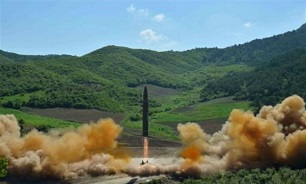New Satellite Images Reveal North Korea Expanding Key Missile Base
 The images, obtained by CNN, offer evidence that the Yeongjeo-dong missile base and a nearby, previously unreported, site remain active and have been continually upgraded, highlighting the continuing gulf between Pyongyang and Washington’s views on denuclearization.
The images, obtained by CNN, offer evidence that the Yeongjeo-dong missile base and a nearby, previously unreported, site remain active and have been continually upgraded, highlighting the continuing gulf between Pyongyang and Washington’s views on denuclearization.
Yeongjeo-dong has long been known to US intelligence agencies but researchers at the Middlebury Institute of International Studies at Monterey said that the construction on a new facility, at Hoejung-ri, seven miles away, had not previously been publicly identified.
“Construction on the previously unidentified site has continued even after the Singapore Summit” between Kim Jong-un and Donald Trump, the US president, in June, said the Institute’s Jeffrey Lewis.
“Whatever Kim says about his desire for denuclearization, North Korea continues to produce and deploy nuclear armed missiles,” he added, The Telegraph reported.
The bases are believed to serve as shelters for mobile missile launchers, and would be able to store the country’s newest long-range missiles, including those capable of carrying nuclear warheads.
The North officially suspended its nuclear and missile tests ahead of the June summit, and missile production and deployment does not technically violate any agreement between Pyongyang and the US and South Korea.
However, ongoing activity at the sites feeds into US criticisms that North Korea is now dragging its heels over the denuclearization process.
John Bolton, the US national security adviser, told the Wall Street Journal earlier this week that President Trump believes he should hold a second summit with Kim early next year as the North Koreans “have not lived up to the commitments” of their first deal in June.
The Singapore summit, while historic in terms of who came to the table, produced a vaguely worded agreement to “build a lasting and stable peace regime” and for North Korea to “work toward complete denuclearization of the Korean Peninsula.”
Several analysts, who have long argued that the US has raised unrealistic expectations on disarmament, expressed little surprise at the new satellite images.
“North Korea isn’t disarming. It never said it would. Bolton cares that it isn’t. But here’s the twist: Trump doesn’t. He has to be well aware of these developments. He just doesn’t care. Kim pretends to disarm and Trump pretends to believe him,” tweeted Vipin Narang, an associate professor of political science at MIT.
Simmering tensions between Pyongyang and Washington do not appear to have stymied backroom talks, however.
Andrew Kim, the head of the CIA’s Korean Mission Centre, reportedly met with senior unnamed North Korean officials in the border village of Panmunjom on Monday.
“North Korea and the US appear to be making headway,” a high-ranking South Korean government source told the Hankyoreh paper.
Details of the talks have not been disclosed. However, Pyongyang has recently also shown frustration with Washington for refusing to meet its concessions.
On Wednesday, the country’s state-run Korean Central News Agency called for the complete suspension of South Korean-US military drills in order to build a permanent and strong peace regime.
In an interview with Radio Free Asia, Thae Yong-ho, who defected from the North while serving as deputy ambassador to the UK, said that Pyongyang would never agree to end its weapons programme through a “complete, verifiable and irreversible denuclearization” process.
But he cautioned the US not to walk away from the table. “If that happens, North Korea will say this to the world: ‘We sincerely tried for nuclear removal and were ready to accept US requirements, but the US insisted on unreasonable conditions’,” he said.
Message end/
